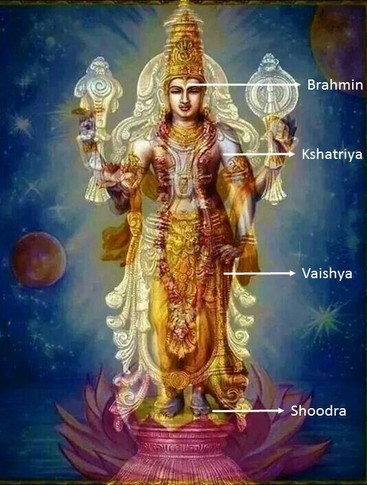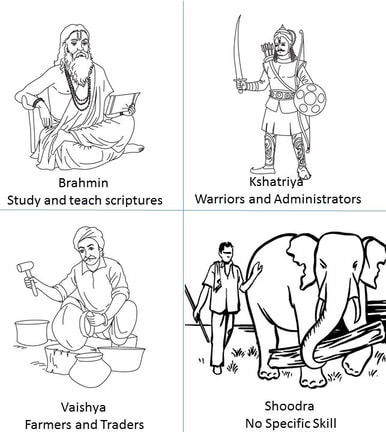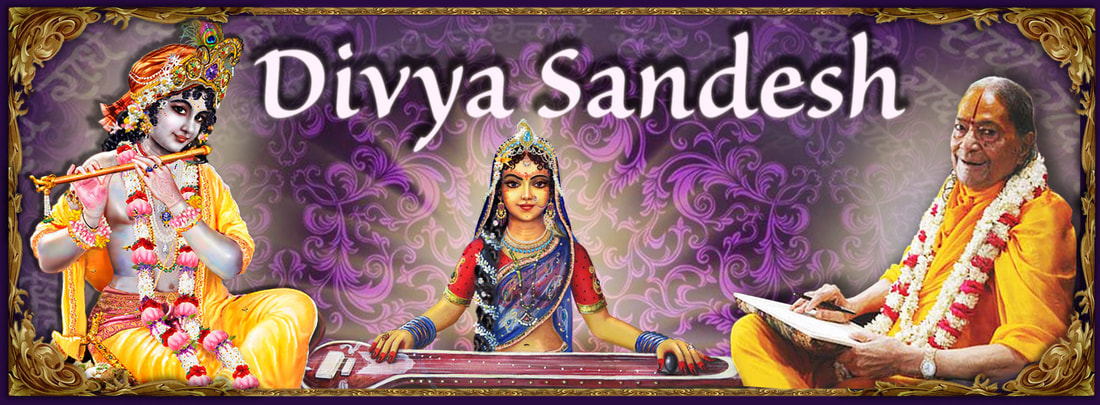
During the age of Satyug, human beings were spiritual, humble, co-operative and satisfied with life. But in the Tretayug, these qualities gradually started diminishing. In order to have the society continue to function in a coordinated manner with everyone owning the accountability for their work, the Vedas recommended that human kind be classified into four categories of people, based on the work they are skilled in and hence expected to perform: Brahmin, Kshatriya, Vaishya, Shoodra.
Before this Sansaar-The World came into existence, there only existed the Brahma - Supreme God Lord Shri Krishna and no-one else. At the time of creation, He opened His eyes and manifested Himself in the form of Karnanavshayee MahaVishnu. With a sideways glance, He also manifested Himself in the form of Garbhodashayee Vishnu or Dwiteeya Purush. Garbhodashayee Vishnu just looked at Prakriti (Maya) and the dormant world started bustling with activity. Then He created innumerable Brahmand (cosmic eggs) and manifested one Brahma, one Vishnu and one Shankar in each brahmand. Each of these brahmand have many lokas.
Brahma then created human beings:
Before this Sansaar-The World came into existence, there only existed the Brahma - Supreme God Lord Shri Krishna and no-one else. At the time of creation, He opened His eyes and manifested Himself in the form of Karnanavshayee MahaVishnu. With a sideways glance, He also manifested Himself in the form of Garbhodashayee Vishnu or Dwiteeya Purush. Garbhodashayee Vishnu just looked at Prakriti (Maya) and the dormant world started bustling with activity. Then He created innumerable Brahmand (cosmic eggs) and manifested one Brahma, one Vishnu and one Shankar in each brahmand. Each of these brahmand have many lokas.
Brahma then created human beings:
- Brahmins emerged from His forehead,
- Kshatriyas from His arms,
- Vaishyas from His thighs and
- Shoodras from His feet.
ब्रह्मणोऽस्य मुखमासीत्... ऋग्वेद पुरुष सूक्त 10.90.11–12
braahmanosy mukhamaaseet... rgved purush sookt 10.90.11–12
braahmanosy mukhamaaseet... rgved purush sookt 10.90.11–12

The classification of individuals in these 4 categories based on their skills is called Varnashram Dharm. The purpose of this classification was to enable running the human society smoothly.
Gradually, driven by the desire to promote their self-interests, the first three classes of individuals, especially the Brahmins, deformed the actual purpose of the caste system and the system became hereditary i.e. the son of a Brahmin will be a Brahmin whether or not he was an expert in studying and teaching the knowledge of the scriptures etc... With this classification, the last section of people, the Shoodra started being considered the lowest class of people and looked down upon.
- Brahmin (ब्राह्मण): intellectuals, who were competent in studying and teaching the scriptures
- Kshatriya ( क्षत्रिय): individuals with special administrative and warrior skills
- Vaishya ( वैश्य): individuals with expertise in farming and trading
- Shoodra (शूद्र): rest of the individuals who did not have a unique expertise, they were deputed to help the other three groups
Gradually, driven by the desire to promote their self-interests, the first three classes of individuals, especially the Brahmins, deformed the actual purpose of the caste system and the system became hereditary i.e. the son of a Brahmin will be a Brahmin whether or not he was an expert in studying and teaching the knowledge of the scriptures etc... With this classification, the last section of people, the Shoodra started being considered the lowest class of people and looked down upon.
Now ponder for a bit on the following points:
In fact, there is no meaning of the caste these days, since no-one complies with the prescribed Vedic rules of their respective caste. It is extremely rare that Brahmins know the Vedas and lead Vedic life. Similarly, other classes of people also do not comply with their respective duties.
The Bhagawat Mahapuran asserts that
- If one were to trace ancestry of every person it would lead back to Creator Brahma (ब्रह्मा) and then Shri Krishna. Since all are children of Shri Krishna, all are brothers. So how can one brother be greater than the other?
- If you say, since Shoodras emerged from the feet of the Lord, they are lowly, then consider the fact that
- God’s feet are served by Maha Lakshmi, the Goddess of fortune. Furthermore, every pore of God’s body is God Himself.
- Moreover everyone bows down to worship God’s lotus feet.
- How can someone emerging from such feet be lower?
- God’s feet are served by Maha Lakshmi, the Goddess of fortune. Furthermore, every pore of God’s body is God Himself.
- God is Bliss. Bliss emanates from every pore of His being and most significantly from His lotus feet. River Ganges is called the holiest river of the world, since she has eternally washed His lotus feet. So what makes Shoodras lowly?
In fact, there is no meaning of the caste these days, since no-one complies with the prescribed Vedic rules of their respective caste. It is extremely rare that Brahmins know the Vedas and lead Vedic life. Similarly, other classes of people also do not comply with their respective duties.
The Bhagawat Mahapuran asserts that
अहो बात श्वपचोऽतो गरीयान् यज्जिह्वाग्रे वर्तते नाम तुभ्यम्। तेपुस्तपस्ते जुहुवुः सस्त्ररार्या ब्रह्मानूचुर्नाम गृणन्ति ये ते।। भा ३.३३.७
batashvapachoto gareeyaan... grnanti ye te . bha 3.33.7
batashvapachoto gareeyaan... grnanti ye te . bha 3.33.7
"Oh, how glorious are they whose tongues are chanting holy name of Lord Krishna! Even if born in the families of dog-eaters, such persons are worshipable." It goes on to further say,"a Brahmin who is not a devotee of the Lord is worse than a Shoodra."
Also, Varnashram Dharm is the religion of the body, not of the Jeev. Jeev is eternally divine since it is a part of the divine Lord.
Also, Varnashram Dharm is the religion of the body, not of the Jeev. Jeev is eternally divine since it is a part of the divine Lord.
 To be eternally happy grow in Spiritual wealth and stature. Refrain from engaging in the rat race of acquiring worldly pleasures.
To be eternally happy grow in Spiritual wealth and stature. Refrain from engaging in the rat race of acquiring worldly pleasures.
Conclusion:
It does not matter whether you are born in a lower caste or a higher caste. All who don't worship The Supreme Lord are downcast. All of them suffer from all afflictions (1)(2)(3) of Maya. When everybody is in the same boat then what difference does it make to be born in lower or higher caste? Cast aside all negative feelings of inferiority, superiority, hate and competition to supersede others. Instead, strive to rise to the highest level to become the eternal servant of the Supreme God (4) like Raidas, Kabir, Shabari, Nanak, Tukaram and numerous others.
God is friend of humble. Taking pride in your higher caste and looking down upon others belonging to other castes, will increase your ego and decrease your love for God. You will gradually start losing the divine attributes(5) of love, sympathy, kindness, forbearance etc. and start acquiring the vices of Maya like anger, passion, greed, hatred etc. So do what is takes to become good.
Aspirants of divine love are advised to stay clear of all pride. Chaitanya Mahaprabhu says:
It does not matter whether you are born in a lower caste or a higher caste. All who don't worship The Supreme Lord are downcast. All of them suffer from all afflictions (1)(2)(3) of Maya. When everybody is in the same boat then what difference does it make to be born in lower or higher caste? Cast aside all negative feelings of inferiority, superiority, hate and competition to supersede others. Instead, strive to rise to the highest level to become the eternal servant of the Supreme God (4) like Raidas, Kabir, Shabari, Nanak, Tukaram and numerous others.
God is friend of humble. Taking pride in your higher caste and looking down upon others belonging to other castes, will increase your ego and decrease your love for God. You will gradually start losing the divine attributes(5) of love, sympathy, kindness, forbearance etc. and start acquiring the vices of Maya like anger, passion, greed, hatred etc. So do what is takes to become good.
Aspirants of divine love are advised to stay clear of all pride. Chaitanya Mahaprabhu says:
तृणादपि सुनीचेन, तरोरपि सहिष्णुना, अमानिना मानदेन, कीर्तनीयः सदा हरिः ॥
trnaadapi suneechen, tarorapi sahishnunaam,
amaanina maanaden, keertanee yah sada harih
trnaadapi suneechen, tarorapi sahishnunaam,
amaanina maanaden, keertanee yah sada harih
Be more humble than a blade of grass, be more forbearing than a tree, give respect to all and never desire respect for yourself.
Humility is the stepping stone on the path of devotion. Any form of pride, including that of position, wealth, education, talent, caste etc. is a major deterrent on this path. Stay clear of all pride.
Humility is the stepping stone on the path of devotion. Any form of pride, including that of position, wealth, education, talent, caste etc. is a major deterrent on this path. Stay clear of all pride.





